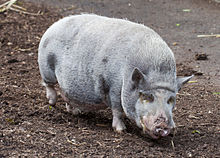

The Turopolje pig ( Croatian: Turopoljska svinja) is a breed of pig named for Turopolje, Croatia, where it originates. This distinctive-looking swine, which has black spots on a white or grey skin with drooping ears, [1] is very rare, and is likely nearing extinction. [2] It is one of the older breeds of European pigs, though it may have had infusions of Berkshire or other bloodlines in the 19th century. [3]
Though it is relatively small and not fast growing, [4] the breed is known for its hardiness under free range conditions. [5] Once one of the most widespread swine in its native country, the change from extensive to intensive pig farming in the mid-20th century discouraged its use. [2]
- ^ "Turopolje", ansi.okstate.edu, Oklahoma State University, archived from the original on 2013-03-30
- ^ a b Matija Harcet; Marija Đikić; Vera Gamulin (2006), "Low Genetic Diversity of the Turopolje Pig Breed" (PDF), Food Technology and Biotechnology, ISSN 1330-9862
- ^ Valerie Porter (2002), Mason's World Dictionary of Livestock Breeds, Types, and Varieties, CABI, p. 253, ISBN 9780851994307
- ^ Max Frederick Rothschild; Anatoly Ruvinsky (31 March 2011), The Genetics of the Pig, CABI, ISBN 9781845937560
- ^ Sepp Holzer (11 April 2011), Sepp Holzer's Permaculture: A Practical Guide to Small-Scale, Integrative Farming and Gardening, Chelsea Green Publishing, ISBN 9781603583701
Picture of sleeping (and video of snoring) Turopolje pigs in South Tyrol: https://picasaweb.google.com/Fritz.Joern/HofSommer13#5912816864147895490


The Turopolje pig ( Croatian: Turopoljska svinja) is a breed of pig named for Turopolje, Croatia, where it originates. This distinctive-looking swine, which has black spots on a white or grey skin with drooping ears, [1] is very rare, and is likely nearing extinction. [2] It is one of the older breeds of European pigs, though it may have had infusions of Berkshire or other bloodlines in the 19th century. [3]
Though it is relatively small and not fast growing, [4] the breed is known for its hardiness under free range conditions. [5] Once one of the most widespread swine in its native country, the change from extensive to intensive pig farming in the mid-20th century discouraged its use. [2]
- ^ "Turopolje", ansi.okstate.edu, Oklahoma State University, archived from the original on 2013-03-30
- ^ a b Matija Harcet; Marija Đikić; Vera Gamulin (2006), "Low Genetic Diversity of the Turopolje Pig Breed" (PDF), Food Technology and Biotechnology, ISSN 1330-9862
- ^ Valerie Porter (2002), Mason's World Dictionary of Livestock Breeds, Types, and Varieties, CABI, p. 253, ISBN 9780851994307
- ^ Max Frederick Rothschild; Anatoly Ruvinsky (31 March 2011), The Genetics of the Pig, CABI, ISBN 9781845937560
- ^ Sepp Holzer (11 April 2011), Sepp Holzer's Permaculture: A Practical Guide to Small-Scale, Integrative Farming and Gardening, Chelsea Green Publishing, ISBN 9781603583701
Picture of sleeping (and video of snoring) Turopolje pigs in South Tyrol: https://picasaweb.google.com/Fritz.Joern/HofSommer13#5912816864147895490